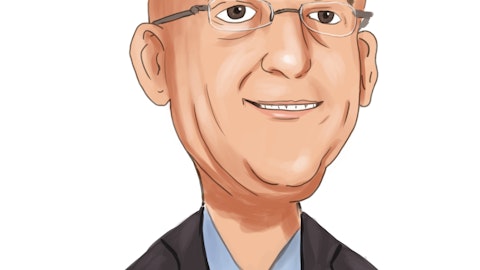Jeffrey Powell: About 7.5% organic growth for several years, which is substantially higher than global GDP. So we would never budget and assume that was going to be the case, say, for the next five years. But I would tell you, when I look at our three sectors, the Material Handling side, I think, is in a good position. The money that’s going to be spent on both the infrastructure bill and the CHIPS Act is just starting to flow. And so we think that our Material Handling sector will benefit from that. The billing side has been quite strong in Europe and in the U.S. from a recycling standpoint. On the paper side, we just talked about the fact that operating rates from operating rates really bottomed out, we think, in ’23, globally, running at about 79%, is forecasted to get back into the mid-80s over the next couple of years.
So we expect kind of some recovery growth in that market. And the Flow Control has always been very steady. It just is a very stable, steady business. The guys always do a great job in finding new end markets. Our biggest market — right, our biggest sector right now is our industrial sector. It’s bigger than all of our others. So I mean there’s a lot of industrial markets out there that we’re taking our products to. So we think the next few years, assuming that something doesn’t happen, black swan event doesn’t happen, we think that growth actually should be pretty solid in the next few years. But we’ve got to see that start to materialize, I think, this year, as the year progresses.
Kurt Yinger: Well, appreciate all the color guys. Thank you.
Jeffrey Powell: You’re welcome.
Operator: Thank you. One moment for our next question. Our next question will come from the line of Larry De Maria from William Blair. Your line is open.
Lawrence De Maria: Thanks. Good morning, everybody. Just a few quick sort of clarifications. I know it’s not unusual, but it was a little bit bigger for the second half than first half. Can you give us kind of order of magnitude second half versus first half? And secondly, maybe you could talk to the financial flexibilities you have after the recent deals. And just the M&A pipeline if we’re out of the market for a while or if it’s still relatively healthy?
Michael McKenney: On the split first half, second half, Larry, I’d say there’s about a 5% delta there.
Lawrence De Maria: Yes.
Jeffrey Powell: And then on the — I would say on the activity side, we’re still quite busy. There’s still — our corporate development people, I think have said that there’s still a tremendous amount of deal flow out there. Our balance sheet, even though we took on a little bit of debt for these most recent acquisitions, our balance sheet is still pretty strong. We think we have good capacity left. So we’re full speed ahead. We won’t be slowing down even though we just did a couple of transactions. As you know, we’re always looking for opportunities that are good strategic fits at a fair value, and that can be challenging from time to time. But our corporate people were very busy, and we’ve got the capacity. And frankly, our current debt agreements were put in place when we were smaller.
So if we needed to free up those at higher levels, we could easily do that, and we’ll do that if needed as we go out and pursue opportunities. So we’re full speed ahead on looking at opportunities.
Lawrence De Maria: Okay. Sounds good. And then now shifting gears a little bit. I know you obviously talked about this a bit already but curious about kind of the order expectation from here and how we’ve done so far. It’s a little bit odd to talk about, I don’t know, the strength in capital equipment term it will get orders restored in 4Q and solid demand, but there’s some certainty keeping the outlook down seems overly conservative. So can you discuss why this isn’t overly conservative, considering the comments and the print you just did? Maybe what areas of the end markets are showing you the weakness and order expectations from here, which — if they could stay flattish or not?
Michael McKenney: Yes. I would say, Gary.
Jeffrey Powell: I pointed to Mike and said you can handle this one, Mike.
Michael McKenney: The biggest thing that we’re looking at is capital, capital order flow, and seeing that we get some traction and get some firmness there. That’s the biggest thing that we’re waiting to get some clarity on.
Jeffrey Powell: Our guys are very busy. As I mentioned, project discussions and activities are actually pretty strong. But the time to close is lengthened. I think as our customers are, again, trying to gauge how quickly rates come down and demand starts to pick up. And so because those discussions are taking longer than normal, it obviously introduces added degree of cost on our part.
Lawrence De Maria: And anything on the order expectations from here? And have we done so far this year? I assume, obviously, capital has been slow.
Jeffrey Powell: Yes. I mean I think right now, things are as expected. Right now as we look through last week, demand is kind of on track with where we would expect it to be.


